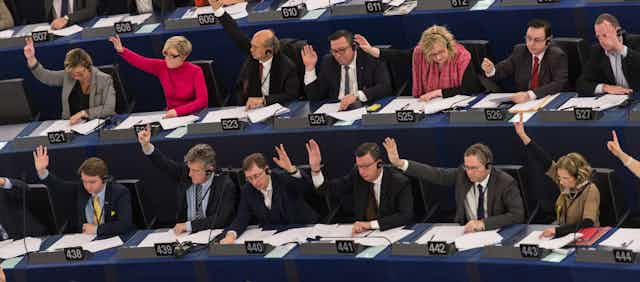British Prime Minister David Cameron may have never foreseen that the European Parliament would get in the way of his plans to strike a deal with the European Union to prevent a Brexit. And although it does have the clout to do it, the chances of a disagreement are slim. The consequences of doing so are enough to discourage even the most quarrelsome of MEPs.
Ahead of the European Council meeting of heads of government, Cameron travelled to Brussels to meet privately with Martin Schulz, the parliament’s German Social Democratic president, and a small group of other federalist parliamentarians. The group included Elmar Brok, an old loyalist to Helmut Kohl, and Guy Verhofstadt, a former Liberal prime minister of Belgium.
The aim was to convince these influential MEPs to support the proposal to give the UK greater freedom from the EU in areas such as giving welfare support to EU citizens from outside the UK.
But Cameron was also keen to meet in this way to avoid addressing the entire parliament together. That could have meant having to respond to taunts from UKIP leader Nigel Farage in a crowded chamber. The PM prefers to pretend Farage doesn’t exist at all, so it would be too much to bear to face the UKIP leader on what is essentially his home turf as an MEP.
Cameron would even be risking praise from Marine Le Pen. The Front National leader would have been keen to flatter the British PM in order to bolster her mission to prompt a Frexit referendum in her native France. The last thing that the PM needs is to aggravate Francois Hollande at this crucial point or to bolster Le Pen’s version of euroscepticism, which is protectionist and likely to be unsympathetic to the desires of the UK’s financial sector that the PM is trying to defend.
Despite its federalist misgivings over a deal for David Cameron, the European Parliament’s leadership also wanted to avoid such a public media showdown.

The parliament is important, as David Cameron has had to learn, because it is like an extra member state when it comes to making decisions about the EU. It can veto any agreement for the UK, even if the European Council, made up of national leaders, approves it.
Because some of the details in Cameron’s proposal require ordinary EU legislation, the parliament is an equal partner with the council when it comes to deciding on them. More significant matters that need a change to the treaties require the consent of the parliament if a full blown constitutional convention is to be avoided. A third option is to insert new rules when an agreement is made to admit a new member state some time in the future – but this too requires the consent of the European Parliament.
If the British people vote to stay in the European Union this June or September, they will be making that decision based on trust. They will have to believe that the parliament will vote in favour of making any changes agreed by Cameron and his fellow EU heads of government. The same happened in Scotland when it held a referendum on independence. The Scottish people had to trust that the British government would see through on the promises it made before the vote about giving greater decision making powers to the Scottish government and parliament.
Just as the SNP threatened to push for a second referendum if these promises were not met, the UK government would be under pressure to repeat an EU-membership referendum if the conditions provisionally offered to the UK by the EU are themselves not enacted. That is not a particularly appealing prospect for MEPs, or indeed, anyone in Brussels.
So while the European Parliament technically has the power to block an agreement with Cameron, it is not a power that it could realistically use. If it did, this whole process could repeat itself.

